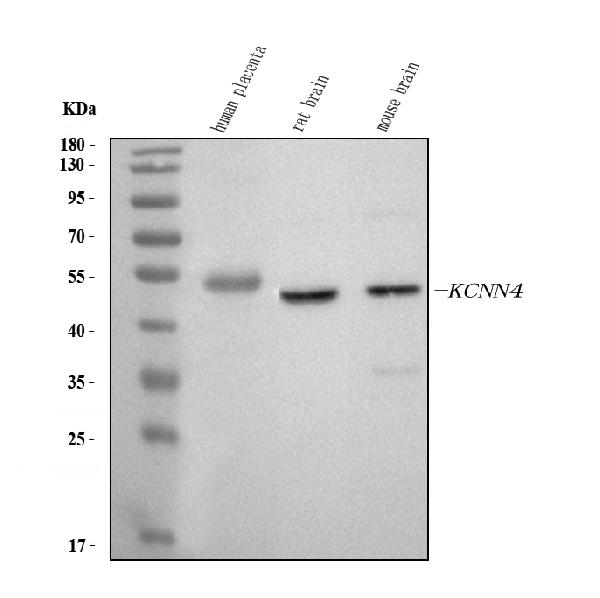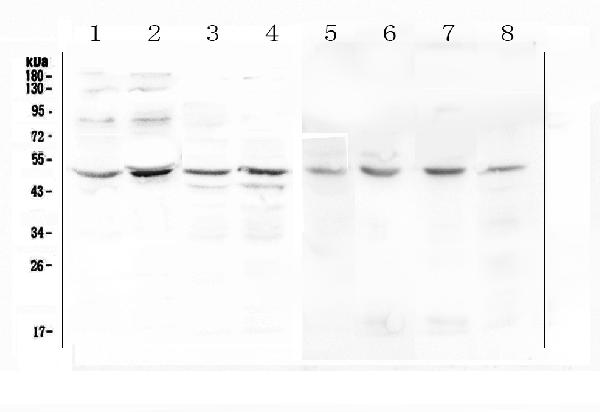Product Info Summary
| SKU: | PA1047-1 |
|---|---|
| Size: | 100 μg/vial |
| Reactive Species: | Human, Mouse, Rat |
| Host: | Rabbit |
| Application: | WB |
Customers Who Bought This Also Bought
Product info
Product Name
Anti-KCNN4 Antibody
SKU/Catalog Number
PA1047-1
Size
100 μg/vial
Form
Lyophilized
Description
Boster Bio Anti-KCNN4 Antibody catalog # PA1047-1. Tested in WB applications. This antibody reacts with Human, Mouse, Rat.
Storage & Handling
Store at -20˚C for one year from date of receipt. After reconstitution, at 4˚C for one month. It can also be aliquotted and stored frozen at -20˚C for six months. Avoid repeated freeze-thaw cycles.
Cite This Product
Anti-KCNN4 Antibody (Boster Biological Technology, Pleasanton CA, USA, Catalog # PA1047-1)
Host
Rabbit
Contents
Each vial contains 4 mg Trehalose, 0.9 mg NaCl and 0.2 mg Na2HPO4.
Clonality
Polyclonal
Isotype
Rabbit IgG
Immunogen
A synthetic peptide corresponding to a sequence at the N-terminus of human KCNN4, different from the related mouse and rat sequences by two amino acids.
*Blocking peptide can be purchased. Costs vary based on immunogen length. Contact us for pricing.
Cross-reactivity
No cross-reactivity with other proteins
Reactive Species
PA1047-1 is reactive to KCNN4 in Human, Mouse, Rat
Applications
PA1047-1 is guaranteed for WB Boster Guarantee
Observed Molecular Weight
48 kDa
Calculated molecular weight
47.696kDa
Background of KCNN4
Intermediate conductance calcium-activated potassium channel protein 1 (KCNN4, Kca3.1) is part of a potentially heterotetrameric voltage-independent potassium channel that is activated by intracellular calcium. Activation is followed by membrane hyperpolarization, which promotes calcium influx. KCNN4 may be part of the predominant calcium-activated potassium channel in T-lymphocytes. This gene is similar to other KCNN family potassium channel genes, but it differs enough to possibly be considered as part of a new subfamily.
Antibody Validation
Boster validates all antibodies on WB, IHC, ICC, Immunofluorescence, and ELISA with known positive control and negative samples to ensure specificity and high affinity, including thorough antibody incubations.
Innovating Scientists Reward
If you are the first to review this product, or if you have results for a special sample, species or application this product is not validated in, share your results with us and receive product credits you can use towards any Boster products! Applicable to all scientists worldwide.
Submit A Review
Assay dilution & Images
Reconsitution
Add 0.2ml of distilled water will yield a concentration of 500ug/ml.
Assay Dilutions Recommendation
The recommendations below provide a starting point for assay optimization. The actual working concentration varies and should be decided by the user.
Western blot, 0.1-0.5μg/ml, Human, Mouse, Rat
Validation Images & Assay Conditions

Click image to see more details
Figure 1. Western blot analysis of KCNN4 using anti-KCNN4 antibody (PA1047-1).
Electrophoresis was performed on a 5-20% SDS-PAGE gel at 70V (Stacking gel) / 90V (Resolving gel) for 2-3 hours. The sample well of each lane was loaded with 30 ug of sample under reducing conditions.
Lane 1: human placenta tissue lysates,
Lane 2: rat brain tissue lysates,
Lane 3: mouse brain tissue lysates.
After electrophoresis, proteins were transferred to a nitrocellulose membrane at 150 mA for 50-90 minutes. Blocked the membrane with 5% non-fat milk/TBS for 1.5 hour at RT. The membrane was incubated with rabbit anti-KCNN4 antigen affinity purified polyclonal antibody (Catalog # PA1047-1) at 0.5 μg/mL overnight at 4°C, then washed with TBS-0.1%Tween 3 times with 5 minutes each and probed with a goat anti-rabbit IgG-HRP secondary antibody at a dilution of 1:5000 for 1.5 hour at RT. The signal is developed using an Enhanced Chemiluminescent detection (ECL) kit (Catalog # EK1002) with Tanon 5200 system. A specific band was detected for KCNN4 at approximately 48 kDa. The expected band size for KCNN4 is at 48 kDa.
Protein Target Info & Infographic
Gene/Protein Information For KCNN4 (Source: Uniprot.org, NCBI)
Gene Name
KCNN4
Full Name
Intermediate conductance calcium-activated potassium channel protein 4
Weight
47.696kDa
Superfamily
potassium channel KCNN family
Alternative Names
hIKCa1; hKCa4; hSK4; IK1; IKCa1; intermediate conductance calcium-activated potassium channel protein 4; KCa3.1IKCA1; KCa4; KCA4SKCa4; potassium intermediate/small conductance calcium-activated channel, subfamilyN, member 4; putative erythrocyte intermediate conductance calcium-activated potassiumGardos channel; Putative Gardos channel; SK4SKCa 4 KCNN4 DHS2, IK, IK1, IKCA1, KCA4, KCa3.1, SK4, hIKCa1, hKCa4, hSK4 potassium calcium-activated channel subfamily N member 4 intermediate conductance calcium-activated potassium channel protein 4|SKCa 4|SKCa4|intermediate-conductance Ca2+-activated K+ channel, KCa3.1|potassium channel, calcium activated intermediate/small conductance subfamily N alpha, member 4|potassium intermediate/small conductance calcium-activated channel, subfamily N, member 4|putative Gardos channel|putative erythrocyte intermediate conductance calcium-activated potassium Gardos channel|small conductance calcium-activated potassium channel 4
*If product is indicated to react with multiple species, protein info is based on the gene entry specified above in "Species".For more info on KCNN4, check out the KCNN4 Infographic

We have 30,000+ of these available, one for each gene! Check them out.
In this infographic, you will see the following information for KCNN4: database IDs, superfamily, protein function, synonyms, molecular weight, chromosomal locations, tissues of expression, subcellular locations, post-translational modifications, and related diseases, research areas & pathways. If you want to see more information included, or would like to contribute to it and be acknowledged, please contact [email protected].
Specific Publications For Anti-KCNN4 Antibody (PA1047-1)
Hello CJ!
No publications found for PA1047-1
*Do you have publications using this product? Share with us and receive a reward. Ask us for more details.
Recommended Resources
Here are featured tools and databases that you might find useful.
- Boster's Pathways Library
- Protein Databases
- Bioscience Research Protocol Resources
- Data Processing & Analysis Software
- Photo Editing Software
- Scientific Literature Resources
- Research Paper Management Tools
- Molecular Biology Software
- Primer Design Tools
- Bioinformatics Tools
- Phylogenetic Tree Analysis
Customer Reviews
Have you used Anti-KCNN4 Antibody?
Submit a review and receive an Amazon gift card.
- $30 for a review with an image
Be the first to review Anti-KCNN4 Antibody
*The first user to submit a review for a product is eligible for Boster's Innovating Scientists Reward, which gives product credits. This is in addition to the gift card reward.
Customer Q&As
Have a question?
Find answers in Q&As, reviews.
Can't find your answer?
Submit your question
4 Customer Q&As for Anti-KCNN4 Antibody
Question
Thank you for helping with my inquiry over the phone. Here are the WB image, lot number and protocol we used for pancreas using anti-KCNN4 antibody PA1047-1. Let me know if you need anything else.
N. Kulkarni
Verified customer
Asked: 2019-11-14
Answer
We appreciate the data. You have provided everything we needed. Our lab team are working to resolve your inquiry as quickly as possible, and we appreciate your patience and understanding! Please let me know if there is anything you need in the meantime.
Boster Scientific Support
Answered: 2019-11-14
Question
We need to test anti-KCNN4 antibody PA1047-1 on rat pancreas for research purposes, then I may be interested in using anti-KCNN4 antibody PA1047-1 for diagnostic purposes as well. Is the antibody suitable for diagnostic purposes?
Verified Customer
Verified customer
Asked: 2019-06-25
Answer
The products we sell, including anti-KCNN4 antibody PA1047-1, are only intended for research use. They would not be suitable for use in diagnostic work. If you have the means to develop a product into diagnostic use, and are interested in collaborating with us and develop our product into an IVD product, please contact us for more discussions.
Boster Scientific Support
Answered: 2019-06-25
Question
I see that the anti-KCNN4 antibody PA1047-1 works with WB, what is the protocol used to produce the result images on the product page?
R. Mitchell
Verified customer
Asked: 2016-03-30
Answer
You can find protocols for WB on the "support/technical resources" section of our navigation menu. If you have any further questions, please send an email to [email protected]
Boster Scientific Support
Answered: 2016-03-30
Question
We are currently using anti-KCNN4 antibody PA1047-1 for human tissue, and we are well pleased with the WB results. The species of reactivity given in the datasheet says human, rat. Is it possible that the antibody can work on horse tissues as well?
J. Brown
Verified customer
Asked: 2014-09-12
Answer
The anti-KCNN4 antibody (PA1047-1) has not been validated for cross reactivity specifically with horse tissues, but there is a good chance of cross reactivity. We have an innovator award program that if you test this antibody and show it works in horse you can get your next antibody for free. Please contact me if I can help you with anything.
Boster Scientific Support
Answered: 2014-09-12





